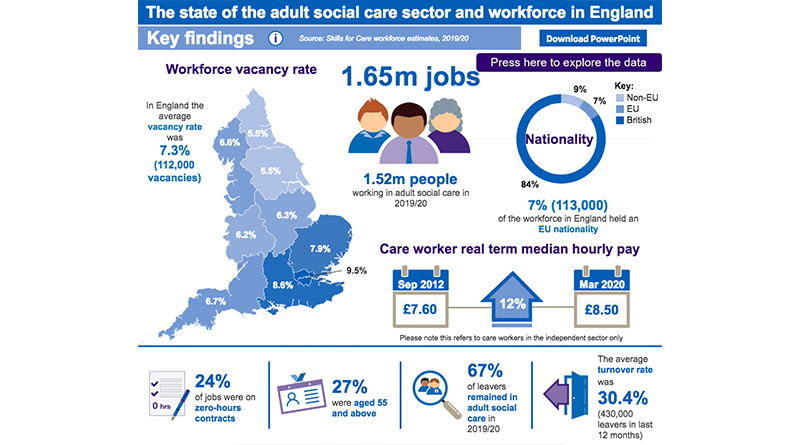Social Care Needs To Fill More Than 100,000 Vacancies
The adult social care sector in England still needs to fill around 112,000 job vacancies on any given day according to a new report published by Skills for Care.
Using data provided by employers to the Adult Social Care Workforce Data Set (ASC-WDS) the annual ‘The state of the adult social care sector and workforce in England’ report showed there had been a slight reduction in job vacancies, but employers still needed to find thousands of new workers.
“Any reduction in the number of vacancies is welcome, but we need to attract more new recruits who have the right values to fill posts that offer long term careers where you can make a difference in people’s lives every single day,” says Skills for Care CEO Oonagh Smyth.
“Once people have discovered the personal satisfaction on offer in social care, we need to keep them by investing in pay, their professional development and creating clear career pathways. We cannot miss this opportunity so we must continue to invest in our frontline staff and dedicated leaders and managers who have made such a difference in keeping people safe and well during the pandemic.
“We will use the quality information in this report to make long-term workforce decisions informed by solid data in what is a critical period of change for a workforce bigger than the NHS.”
Welcoming the report Minister of State for Care, Helen Whately, said: “We cannot thank our care workers enough. They have worked tirelessly through the pandemic to give compassionate care to our loved ones. No one should underestimate the skills and commitment of care workers.
“I welcome this report giving us more insight into our social care workforce. It underlines the challenge for social care employers to recruit and retain staff – and the importance of investing in training and career opportunities.
“Recognising the recruitment challenge we have run a national recruitment campaign highlighting the important work care workers do and launched the ‘Join Social Care’ online recruitment tool. We’re also working with DWP to promote adult social care careers to jobseekers.
“We are supporting care providers through the pandemic with the costs of pay for staff required to self-isolate and so no care worker should lose income as a result of the requirement to only work in one location, with the £1.1 billion infection control fund. As we come through the pandemic I want to see ever more appreciation of the care workers we rely on to look after the most vulnerable in our society.”
The report also reveals the percentage of days lost to sickness in adult social care across England during the pandemic increased to 7.5% between March and August 2020 compared to 2.7% pre-COVID-19.
The staff vacancy rate for employers updating ASC-WDS data between March and August 2020 was 7.0%, down from the pre COVID-19 rate for those employers which was around 8.6%.
CQC Chief Inspector of Adult Social Care Kate Terroni said: “We welcome Skills for Care’s report. For years, we’ve been calling for a better funding settlement for adult social care. Last year, we warned that the continuing lack of a long-term sustainable solution for adult social care was having a damaging impact on the quality and quantity of available care.
“Our latest State of Care report makes clear that these issues need to be urgently addressed and also calls for a new deal for the care workforce, which develops clear career progression, secures the right skills for the sector, better recognises and values staff, invests in their training and supports appropriate professionalisation.
“We’re committed to ensuring safe, effective, compassionate and high-quality care and are working with the Department of Health and Social Care and others to support the care system through winter.”
Other key findings from this influential report include:
- Adult social care is a growing sector that, in 2019/20, comprised of around 18,200 organisations across 38,000 care-providing locations and a workforce of around 1.52 million compared to around 1.4 million NHS workers.
- The adult social care sector was estimated to contribute £41.2 billion per annum to the economy in England, which is worth more than the oil industry and the culture sector.
- Around 84% of the adult social care workforce were British, 7% (113,000 jobs) had an EU nationality and 9% (134,000 jobs) had a non-EU nationality.
- The UK will adopt a points-based immigration system from January 1st 2021, ‘Care worker’ was not listed as an eligible occupation on the ‘Skilled Workers’ route. Therefore care workers will not be able to immigrate into the UK to take up these roles from 1 January 2021.
- Care worker pay has increased at a faster rate since the introduction of the National Living Wage (NLW). Since the launch of the NLW the hourly rate has increased by an average of 30 pence per year (3.9%) compared to 1.9% per year prior to the NLW. The proportion of care workers paid the statutory minimum amount has increased since the introduction of the NLW, from 16% in March 2016 to 23% in March 2020, and sales and retail assistants now, on average, earn 24p per hour more than care workers.
- Skills for Care estimates that 7.3% of roles in adult social care were vacant in 2019/20, equivalent to 112,000 vacancies at any one time.
- Skills for Care estimates that the staff turnover rate of directly employed staff working in the adult social care sector was 30.4% in 2019/20.
- Using data from care homes updating ASC-WDS between March and August 2020, the occupancy rate has fallen for 87% to 79% in care homes with nursing and from 87% to 82% in care homes without nursing. Over the same period, there was no evidence of the number of staff employed falling overall.
To download the report and the infographic go to www.skillsforcare.org.uk/stateof






